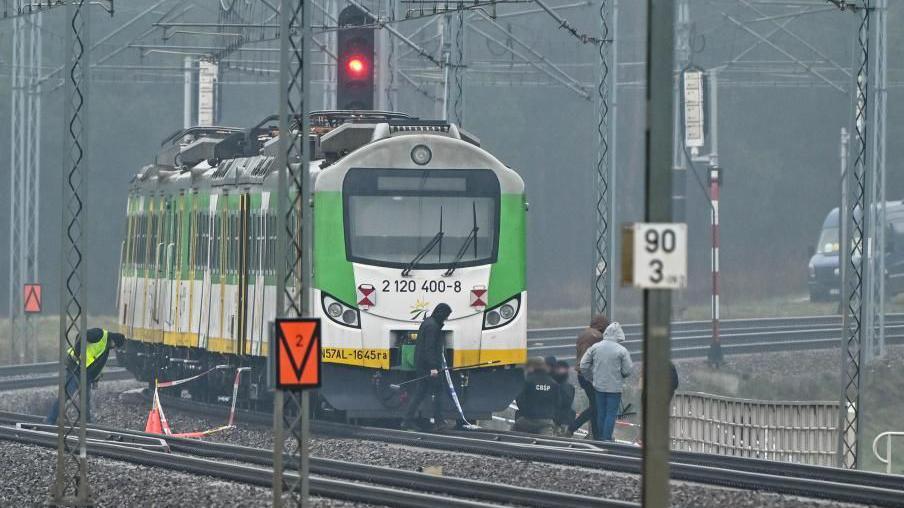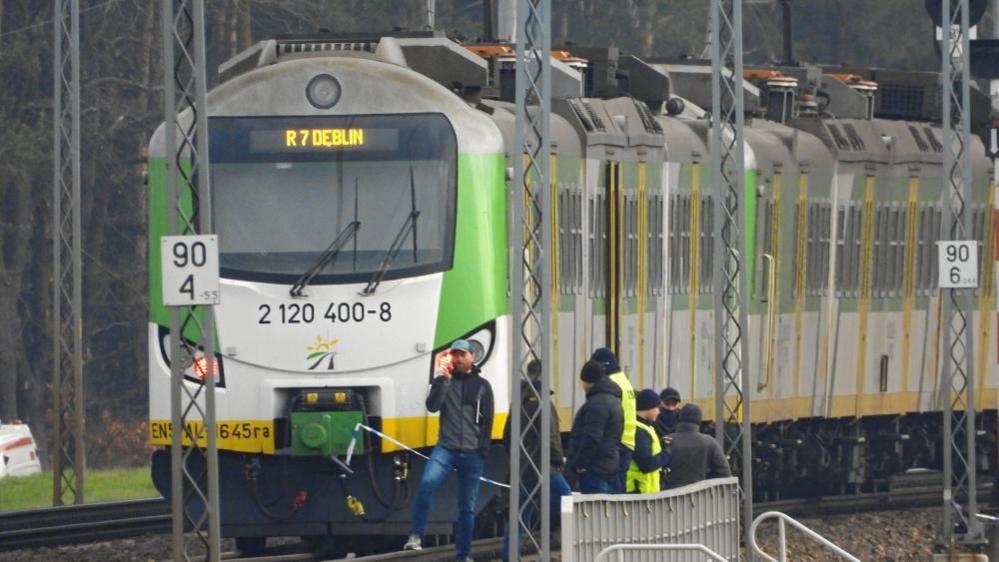Two Ukrainians working for Russia behind rail sabotage, Polish PM says

The Polish prime minister said a military-grade C4 explosive device detonated on Saturday near the village of Mika
- Published
Two Ukrainian citizens who have long worked for Russian intelligence have been identified as the suspects behind two acts of sabotage on Poland's rail network, Polish Prime Minister Donald Tusk has said.
One of the suspects had already been convicted in absentia of acts of sabotage in Ukraine, Tusk told Poland's parliament.
On Monday, he visited the scene of an explosion near Mika, south-east of Warsaw, which damaged the railway line leading to the Ukrainian border at the weekend, and called it "an unprecedented act of sabotage".
Another incident further down the line near Pulawy on Monday forced a packed train to stop suddenly and damage was found to overhead cables.
Polish authorities had initially said there was a very high chance that the two acts of sabotage on the Warsaw-Lublin railway line on had been ordered by a "foreign service".
Then a spokesman for Poland's special services minister said on Tuesday that "everything points to them being Russian special services".
Russia has not yet publicly commented on the allegations.
"The goal was to cause a rail catastrophe," Tusk told MPs.
The Polish prime minister said he would not disclose the names of the two suspects as this could complicate the operation, though he told parliament that one was living in Belarus and the other was a resident of eastern Ukraine.
Both suspects had crossed into Poland from Belarus during the autumn and had now returned there via the border crossing at Terespol in the far south-west of Belarus, close to the Ukrainian border, he added.
Tusk said that a military-grade C4 explosive device detonated on 15 November at about 21:00 local time (20:00 GMT) near the village of Mika.
The explosion, which happened as a freight train was passing, caused minor damage to a wagon floor. It was captured on CCTV.
Tusk said the train driver did not even notice the incident.
A previous attempt to derail a train by placing a steel clamp on the rail had failed, he said.
The second act of sabotage, on 17 November, involved a train carrying 475 passengers having to suddenly brake due to damaged railway infrastructure, said Tusk.
The prime minister also said he would issue an order later on Tuesday to raise the alert level on certain railway lines.
He said since the start of last year 55 people had been detained on suspicion of assisting, preparing, or committing acts of sabotage and that 23 of them had been remanded in custody.
Russia's motivation, Tusk went on, was to sow panic and stir up anti-Ukrainian sentiment in Polish society, which is home to more than one million Ukrainian war refugees.
"I want to emphasise that what the Russian authorities care about is not only the direct effect of this type of action, but also the social and political consequences of the fact that this action is taking place," he said.
"This of course means disorganisation, chaos, panic, speculation and uncertainty."
Poland is both a Nato and EU member state, and its railway network has become vital for moving for supplies of aid into Ukraine since Russia launched its full-scale invasion in February 2022.
In September, Tusk said three Russian drones were shot down by Polish and other Nato aircraft in Poland's airspace during overnight attacks on Ukraine.
He said at the time that authorities had recorded 19 drone incursions, with some flying deep enough to temporarily close four airports, including Warsaw's main hub Chopin.
Russia's defence ministry responded by saying there had been "no plans" to target facilities on Polish soil.
Related topics
- Published3 hours ago
